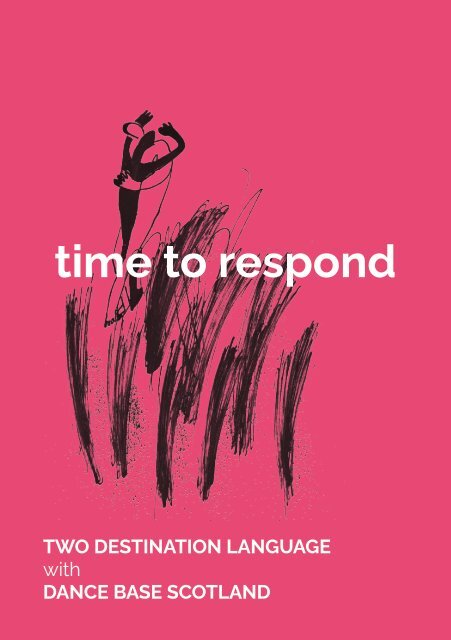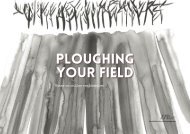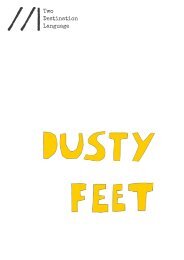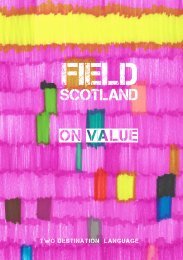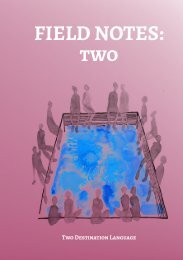time to respond
responses by Two Destination Language's Alister Lownie and Katherina Radeva to the work developed by artists on the residency curated for Dance Base Scotland in early 2021.
responses by Two Destination Language's Alister Lownie and Katherina Radeva to the work developed by artists on the residency curated for Dance Base Scotland in early 2021.
Create successful ePaper yourself
Turn your PDF publications into a flip-book with our unique Google optimized e-Paper software.
<strong>time</strong> <strong>to</strong> <strong>respond</strong><br />
TWO DESTINATION LANGUAGE<br />
with<br />
DANCE BASE SCOTLAND
Hello friends,<br />
How are you?<br />
Thank you for reading this, perhaps even holding this little pink explosion in<br />
your hands.<br />
It felt really important <strong>to</strong> us <strong>to</strong> make a thing, an actual thing you could <strong>to</strong>uch<br />
with your fingertips. A thing for you <strong>to</strong> feel, a thing for you <strong>to</strong> have, a thing <strong>to</strong><br />
pick up or a thing <strong>to</strong> receive.<br />
We don’t know about you but for us, we are really craving tactility and <strong>to</strong>uch.<br />
This has been a <strong>time</strong> where so much of our lives have been spent online, in<br />
front of a screen.<br />
In many ways, this pink thing is also about a <strong>time</strong> we planned <strong>to</strong> spend next <strong>to</strong><br />
each other (albeit with a manda<strong>to</strong>ry distance), which instead we spent online.<br />
But it feels really important <strong>to</strong> find a way <strong>to</strong> share a bit of a response <strong>to</strong> <strong>time</strong> <strong>to</strong><br />
<strong>respond</strong> because although we connected with each other’s projects mainly<br />
online, within each project there was action and interaction and connection <strong>to</strong><br />
celebrate and <strong>to</strong> share.<br />
This pink thing is our response <strong>to</strong> the residency we curated for Dance Base. A<br />
week in the cold February of 2021. A week of exploration and experimentation.<br />
A week of questioning and connecting. A week of wading through the debris of<br />
this <strong>time</strong>. A week where seven artists and their collabora<strong>to</strong>rs went off and did<br />
their thing with all the pent-up energy, jubilation, density and overwhelm of<br />
this <strong>time</strong>.<br />
Here you will find some hints of what that cold week in February 2021 was like,<br />
what we chatted about, what tickled us and what provoked us, a keyhole for<br />
you <strong>to</strong> peek through.<br />
Katherina and Alister<br />
Two Destination Language
CONNECTIONS<br />
We speak about connection. Again and again and again and again and again.<br />
About the gaps between us, the potential of crossing the voids. Staring in<strong>to</strong> our<br />
computer screens, the internet offers our images <strong>to</strong> one another. We speak<br />
about the difference between rhizomatic and mycelial networks, about<br />
whether the network itself communicates. About quantum physics. About<br />
maps as unreliable guides, holding in stasis a dynamic thing. We sink in<strong>to</strong> the<br />
digitised sounds and pixels of one another’s thinking.<br />
About our weight falling constantly in<strong>to</strong> the floor, our minds tending <strong>to</strong> the<br />
shifting sensations rising up through our soles, feeling the sand between<br />
another’s <strong>to</strong>es, our fingers twitching as they reach <strong>to</strong> grasp a phone.<br />
About emptying ourselves, offering a space for occupation by the rocks and<br />
seaweed and crabs. The not-body of our body constantly becoming.<br />
About sharing a body, offered for occupation, and sent out in<strong>to</strong> the world <strong>to</strong><br />
give presence <strong>to</strong> the housebound.<br />
About making marks and traces.<br />
About leaving nothing behind.
BODIES<br />
A lifted body’s skin shines white against a dark-clothed figure. Bare <strong>to</strong> the glass<br />
and concrete, a soft surface which wraps itself around them.<br />
The body’s boundary edge is a raw sensory mass, constantly ready <strong>to</strong> report<br />
back each encounter. What does each body feel, where it <strong>to</strong>uches another<br />
person? What does a hand feel, where it holds the weight of the body it is part<br />
of, above a gritty pavement? What does the eye feel, exposed <strong>to</strong> February’s<br />
dawn air? I see two bodies, crab-like on a pavement, and imagine the shards of<br />
dirt pressing back in<strong>to</strong> their fingertips, the resistance <strong>to</strong> clean soft lines.<br />
We talk about the bodies <strong>to</strong>uching. How strange it seems, <strong>to</strong> those alone, <strong>to</strong><br />
watch those sharing a household and able <strong>to</strong> <strong>to</strong>uch. How our awareness of<br />
proximity has changed in the past year. How we ache for community and<br />
<strong>to</strong>getherness.<br />
Elsewhere, bodies merge with the built environment, not asserting their<br />
separation but seeking the cracks <strong>to</strong> assimilate one in<strong>to</strong> the other, <strong>to</strong> mix and<br />
make something out of the mixity. The act of feeling a way of joining.<br />
It’s strange, seeing and hearing these things from afar, unable <strong>to</strong> share a space.
SPACE and PLACE<br />
We speak about space.<br />
The pandemic has brought a new<br />
attention <strong>to</strong> the spaces we share, and<br />
those which are private. It’s not just<br />
the awareness of proximity, but a<br />
recalibration of the politics of space.<br />
How far a personal space extends.<br />
The radical nature of shared spaces.<br />
The architecture and ownership of<br />
shared spaces:<br />
Who permits access, who controls<br />
the space,<br />
How people are routed around or<br />
through it.<br />
The role of money.<br />
The meaning of public.<br />
The forbidden spaces that sit<br />
invitingly close:<br />
Locked gardens in the centre of<br />
squares<br />
Waterfront paths behind fences<br />
And now,<br />
Locked shopping centres,<br />
Locked arts centres,<br />
Locked livelihoods.<br />
Cathedrals without worshippers.<br />
Inside our homes<br />
Without visi<strong>to</strong>rs<br />
We crave <strong>to</strong>uch.<br />
And we are more alive than ever <strong>to</strong><br />
our senses<br />
Temperature<br />
Balance<br />
Proprioception<br />
As we sit at rest, gazing at each other<br />
through computer screens, we<br />
cannot feel the spinning planet<br />
(460 metres per second)<br />
We cannot feel our orbit of the sun.<br />
(30 kilometres per second)<br />
We cannot feel our universe<br />
expanding.<br />
(72 kilometres per second per<br />
Megaparsec)<br />
(a Megaparsec is about 3.3 million<br />
light years)<br />
We note the lag in our video<br />
connections.<br />
And find fibre optics work around<br />
two-thirds the speed of light.<br />
200,000 kilometres per second.<br />
We’re moving fast.
THE GROUND WE WALK ON<br />
Almost everywhere, when you look,<br />
The ground is unnatural.<br />
Shaped by human labour:<br />
Trees cleared, s<strong>to</strong>nes shifted, earth tilled, planted, harvested.<br />
Foundations dug, cement poured, s<strong>to</strong>nes laid.<br />
Sand blasted in<strong>to</strong> glass, rocks in<strong>to</strong> steel.<br />
Unnatural, unless you count human as natural.<br />
Eventually, we’ll be in the ground ourselves.<br />
Gravity will win, and draw us through the crust.<br />
We float and coast and roll and fly, attentive <strong>to</strong> balancing and falling.<br />
Reaching high defies the fear of breaking on it.<br />
Until then, it supports us.<br />
Lets us belong upon it.<br />
Connects us all.<br />
The ground we move upon is owned.<br />
It is our work <strong>to</strong> be here.<br />
Knowing the labour it has taken <strong>to</strong> be here.
ESSENTIAL WORK<br />
Why do we do what we do?<br />
Is it enough <strong>to</strong> want <strong>to</strong> do something?<br />
What will it mean?<br />
For us? For those who see us?<br />
Jian tells us over lunch that aloneness is related <strong>to</strong> ego. Perhaps we can give<br />
ourselves up <strong>to</strong> inhabiting space. To opening inner space. To a boundlessness.<br />
It’s easy <strong>to</strong> focus on the walls and what divides us.<br />
Harder <strong>to</strong> cultivate connection.<br />
We slurp soup as conversation turns <strong>to</strong> trance states. The calming, stilling,<br />
interiorising practices of body weather, transcendental meditation and<br />
journaling. Hot soup on a cold wintry day, the ice outside protected by the shadows<br />
of chimneys. The dominance of working in studios, of making products for those<br />
and of selling tickets <strong>to</strong> sit in those, has been broken by the pandemic. The<br />
creation of inner space, the merging of background and object <strong>to</strong> haze the<br />
boundary skin may seem: these can achieve a spaciousness an audience can<br />
access, a transitional space which is psychic and physical. A resistance <strong>to</strong><br />
constant commodification. Our spoons clatter in empty bowls, bread soaking up<br />
the dregs. We want audiences. We want <strong>to</strong> share sensations, feelings, moments.<br />
To overcome the binaries of us and them. Where do we want it <strong>to</strong> happen?<br />
A year without studios and theatres and gatherings has recalibrated us in<br />
different ways. As we talk, I wonder about the difference between missing and<br />
wanting. I miss sitting in neat rows watching a stage. I miss the lights, and their<br />
effect on bodies. I miss the surprise of costume. I miss the shared moment of<br />
recognition when a piece of music starts. I miss feeling the effort of a<br />
performer.<br />
But how much do I want them now? How much have our ideas about<br />
performance shifted, seeking shared experiences unlike those of the studios<br />
we had before, seeking intimacies unlike those of the theatre we had before.<br />
Where do we want it <strong>to</strong> happen?
ENTROPY<br />
This <strong>time</strong> has been permission <strong>to</strong><br />
move in<strong>to</strong> intimacies otherwise<br />
unachievable.<br />
Picking up lost conversations.<br />
Seeking influencers who write<br />
thoughtful books and don’t post<br />
selfies.<br />
Making space for new habits.<br />
Is this merely dialogue for an ending<br />
world?<br />
Twenty years in<strong>to</strong> a 21st century<br />
lurching from crisis <strong>to</strong> crisis.<br />
What remains?<br />
What sustains?<br />
What’s important?<br />
The technology allows us <strong>to</strong> meet.<br />
At eye level.<br />
We can cast it off for now, but…<br />
How long until we’re all cyborg?<br />
Whose body would you inhabit?<br />
How would that body change you?<br />
We speak of the accents of cows<br />
from different places, and their<br />
inaccessible cultures.
GAZED UPON<br />
Most of the <strong>time</strong>, the only eyes upon us are virtual, mediated by cameras and<br />
miles of cabling. Out in the streets, we feel the direct gaze we remember from<br />
the before-<strong>time</strong>s, an eyeline leveled at us.<br />
We speak of the watched body. A body surveilled not by technologies and<br />
governments, but by a person invited <strong>to</strong> watch, a group of people invited <strong>to</strong><br />
watch.<br />
One of us remembers being chronically shy, and finding that performing dance<br />
was a way of being with people, communicating with people, without<br />
embarrassment and shame.<br />
More than one of us thinks of flow, of energies directed, of emptying and filling,<br />
of controlling the audience and their gaze.<br />
One of us seeks <strong>to</strong> lose self-consciousness, exposing the body <strong>to</strong> escape the<br />
sense of audience attention and avoid a pressure <strong>to</strong> make something beautiful.<br />
More than one of us thinks of composition, of creating moving images. We talk<br />
about the effect of changing the body performing in that image, of different<br />
people moving the same score.<br />
One of us says that in dance, nothing is wrong, there are no mistakes.<br />
More than one of us reaches <strong>to</strong>wards a natural language, a communication<br />
which cannot rely on words, reaching back in<strong>to</strong> intuition for something.<br />
One of us says a literally precise descriptive language is unhelpful <strong>to</strong><br />
understanding, and embraces the more accurate ambiguities of the poetic.<br />
More than one of us agrees.
OVERWHELM<br />
We are exhausted.<br />
Video makes us fussy,<br />
Seeking a more perfect version liveness disallows.<br />
It’s hard, allowing uncertainty, in this <strong>time</strong>, in this medium.<br />
Too much pressure on ourselves.<br />
Constantly changing contexts.<br />
Flailing around in doubt <strong>to</strong> find direction.<br />
After all the pushing, pulling, lifting, melting, reaching, turning, stretching,<br />
stroking, hanging, bouncing, shifting, retreating, embracing, flowing, resisting,<br />
ordering, composing, framing, cutting, rushing, pausing, waiting, trying:<br />
We’ve fallen.<br />
We’ve finally given up control.<br />
Felt vulnerable, helpless, sore.<br />
It’s OK <strong>to</strong> s<strong>to</strong>p.<br />
Despite determination. (Because of it.)<br />
Despite the constant companion of imagination. (Because of it.)<br />
Despite our evolving practices. (Because of them.)<br />
It’s OK <strong>to</strong> s<strong>to</strong>p.<br />
To be still.<br />
Still inside ourselves.<br />
We cry <strong>to</strong>gether.
words by Alister Lownie<br />
drawings by Katherina Radeva<br />
<strong>time</strong> <strong>to</strong> <strong>respond</strong> contained projects led by Jian Yi, Laura Paterson, Lindsay<br />
Oliver & Fiona Oliver-Larkin, Lucy Suggate, Mark Bleakley, Suzi Cunningham<br />
and Tamsyn Russell<br />
— find out more at www.dancebase.co.uk/professional/<strong>time</strong>-<strong>to</strong>-<strong>respond</strong>/<br />
the artists were supported by Beth Chalmers and Louise Gregory<br />
curated by Two Destination Language’s Alister Lownie and Katherina Radeva<br />
commissioned by Dance Base Scotland thanks <strong>to</strong> support from Creative<br />
Scotland with funding from Scottish Government via the Performing Arts<br />
Venue Relief Fund<br />
© Two Destination Language 2021


